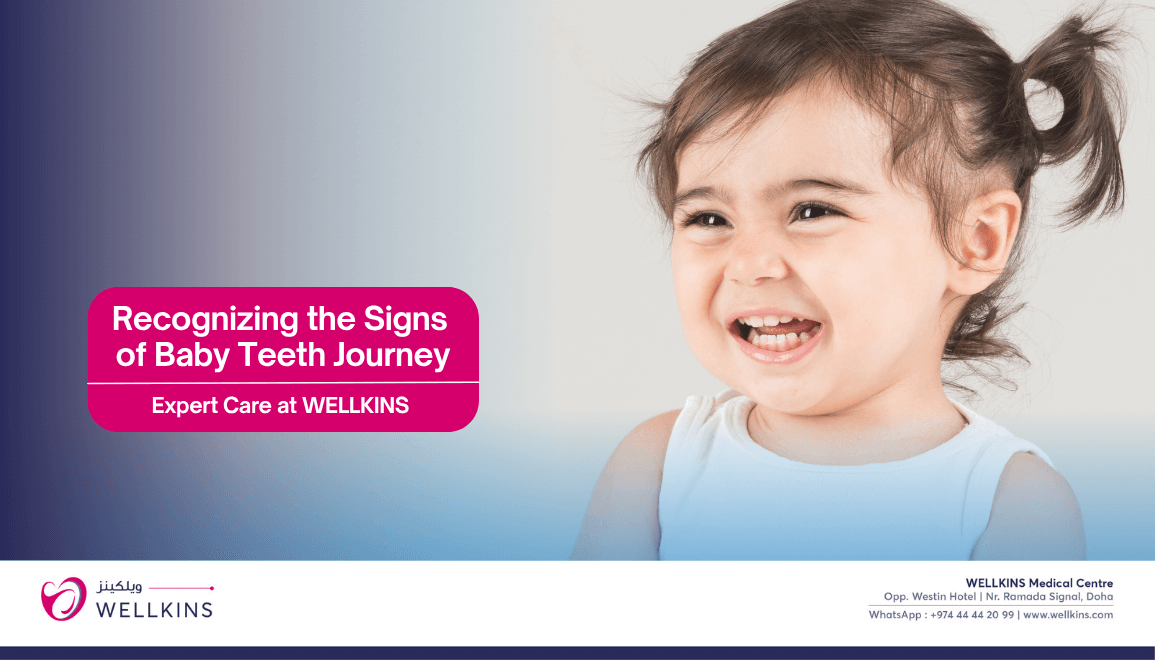Author: Dr. Rahmathunnisa AM (General Dentist – Wellkins Medical Centre)
As parents, you meticulously care for every aspect of your child’s health, and their oral hygiene is a vital part of their overall wellness. From their first gummy smile to their first lost tooth, their dental development is rapid and requires attention. At Wellkins Medical Centre, we understand that navigating baby teeth, handling teething pain, and establishing those crucial early brushing habits can be challenging. By addressing these concerns with knowledge and consistency, you set the foundation for a lifetime free of major dental issues.
We’ve compiled this guide to help you protect your child’s smile right from the start, ensuring a lifetime of healthy teeth and gums.
“Parents need the knowledge to establish proactive dental care right from infancy. It emphasizes that oral hygiene isn’t just about preventing cavities; it affects nutrition, speech development, and confidence. Consistent care, coupled with regular pediatric dental visits, is the best investment in a child’s long-term systemic health and a confident, healthy smile.”
The Importance of Baby Teeth
Often called “milk teeth” or primary teeth, these small teeth are much more than just temporary placeholders; they are structural necessities. They are designed to last until the permanent teeth are ready to erupt, typically around age 6 to 12.
Space Management: Baby teeth hold the precise space in the jaw needed for the larger permanent teeth that are constantly forming beneath the gums. If a baby tooth is lost prematurely due to decay or injury, the adjacent teeth can shift, leading to severe crowding when the permanent tooth finally tries to emerge.
Speech Development: They provide the necessary structure for your child to articulate sounds and speak clearly. Dental issues, even at a young age, can interfere with speech patterns.
Nutrition: They allow your child to chew food properly and efficiently, which is essential for healthy digestion and the absorption of nutrients vital for growth.
Jaw Development: They stimulate and guide the proper development of the jaw bones and supporting muscles.
A common misconception is that decay in baby teeth doesn’t matter since they fall out anyway. This is false! Severe decay can cause intense pain, persistent oral infection, and can even damage the underlying permanent tooth bud developing below the gum line.

The Teething Journey: Comforting Your Child
Teething the natural process of primary teeth pushing through the gums typically begins around six months of age and can be an uncomfortable and frustrating time for babies and parents alike. This phase can last intermittently for two years until all baby teeth are through.
Recognizing the Signs:
- Irritability and restlessness, particularly at night.
- Excessive drooling, which can sometimes lead to mild facial rashes.
- A frantic desire to chew on everything they can grasp.
- Visibly swollen, tender, or slightly red gums. While low grade fever might accompany fussiness, high fever is usually not caused by teething and should be evaluated by a pediatrician.
Comfort Solutions from Wellkins:
Massage: Gently rubbing your baby’s gums with a clean finger for a few minutes can provide counter-pressure relief.
Teething Aids: Provide chilled (but not frozen, as extreme cold can harm the gums) teething rings or a cold, wet washcloth for them to safely chew on.
Cool Foods: For older babies who have started solids, cooled, soft foods like yogurt, purees, or peeled, chilled cucumber sticks can offer topical relief.
Pain Relief: If your baby is highly distressed and unable to sleep, discuss appropriate, measured doses of over the-counter pain relievers with your pediatrician or pharmacist. We strongly advise against using teething gels containing Benzocaine due to potential health risks in infants.
Establishing Healthy Brushing Habits
Dental care should begin before the first tooth even erupts! Good habits prevent cavities and are vital for normalizing the daily routine, setting the stage for a positive relationship with dental hygiene throughout their lives.
Before the First Tooth (Birth to 6 Months): Wipe your baby’s gums gently with a clean, moist gauze pad or a soft infant toothbrush twice a day, especially after the last feeding and before bed. This simple action removes lingering bacteria, stimulates the gums, and begins the important ritual of routine oral cleaning.
When the First Tooth Appears (Around 6 Months):
- Switch to a Brush: Use a soft bristled, child-sized toothbrush designed to fit their mouth.
- Fluoride Toothpaste: Use a tiny smear of fluoride toothpaste no larger than a grain of rice. Fluoride is essential because it strengthens enamel and protects against acid erosion.
- Brushing Technique: Brush all surfaces of the teeth gently in small circular motions. Parents must always perform the brushing, as children lack the necessary fine motor skills and attention span for effective cleaning until they are about 7 or 8 years old.
For Ages 3 to 6 Years
- Increase Toothpaste Amount: Use a pea-sized amount of fluoride toothpaste.
- Supervision is Key: Always supervise brushing carefully. Ensure they are doing a thorough job, and, most importantly, teach them to spit out the excess toothpaste after brushing rather than swallowing it, which reduces fluoride ingestion.
Your Child’s First Dental Visit
We recommends that a child’s first dental visit should occur within six months of the first tooth erupting, or no later than their first birthday. This milestone visit establishes the foundation for consistent preventive care.
This initial visit is critical for early detection of issues like “Baby Bottle Tooth Decay” and for setting a positive, non-threatening tone about dental care. At Wellkins Medical Centre, the first visit usually involves:
- A gentle, visual examination of the teeth, jaw alignment, gums, and surrounding oral tissues.
- Wiping or brushing the teeth to demonstrate proper technique to the parent.
- A crucial discussion about proper cleaning techniques, dietary habits, pacifier use, and thumb sucking habits.
- Assessing the child’s specific risk level for decay based on diet and family history.
The goal is to establish a reassuring “dental home” where your child feels comfortable and safe. Positive early experiences significantly reduce the likelihood of developing dental anxiety later in life, making future visits easier.
Protecting Against Decay: Practical Tips
Preventing childhood tooth decay requires diligence, especially regarding diet and bedtime routines:
Limit Sugary Drinks: Never put your baby to bed with a bottle containing milk, formula, juice, or sweetened liquids. Sugars pool around the sleeping baby’s teeth, causing rapid and severe decay known as “Baby Bottle Tooth Decay.” Only plain water is safe at bedtime.
Monitor Snacking: Limit frequent, sugary, or sticky snacks like candy, dried fruit, or crackers. Frequent snacking, even on seemingly healthy foods, keeps the mouth’s acid level high. Offer healthy alternatives like cheese, plain yogurt, and fresh vegetables instead.
Nighttime Routine: The last cleaning of the day is the most important no food or drink (except water) should follow the final brush. This ensures the fluoride protects the teeth throughout the night.

Your Child’s Oral Health Journey with Wellkins
Give your child the lifelong gift of a healthy start! By understanding the importance of baby teeth, navigating the teething phase with confidence, and establishing consistent brushing habits, you lay the strongest possible foundation for their oral health.A bright, healthy smile is more than just aesthetics; it’s fundamental to proper speech, nutrition, and overall well being. At Wellkins Medical Centre, we ensure early and regular dental attention supports your child to grow with confidence and avoid potential discomfort down the line. Protecting their precious smile is one of the most valuable investments you can make in their future health and happiness, and our caring team is here to guide every step of that journey.
To book an appointment at Wellkins Medical Centre: https://wellkins.com/visit







